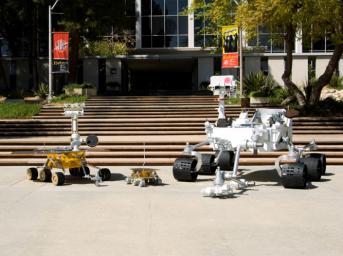
|
Newest is Biggest: Three Generations of NASA Mars Rovers
- Click the image above for a larger view
- Full-Res JPEG (1107 x 827) (150.1 kB)
- Full-Res TIFF (1107 x 827) (2.8 MB)
Caption:
Full-scale models of three generations of NASA Mars rovers show the increase in size from the Sojourner rover of the Mars Pathfinder project that landed on Mars in 1997 (center), to the twin Mars Exploration Rovers Spirit and Opportunity that landed in 2004 (left), to the Mars Science Laboratory rover for a mission to land in 2012 (right).
The Mars Science Laboratory rover is about 9 feet wide, 10 feet long (not counting its robotic arm) and 7 feet tall.
The Mars Science Laboratory rover will have a mass of about 875 kilograms (1,929 pounds), compared with 174 kilograms (384 pounds) for each of the Mars Exploration Rovers and with 11 kilograms (24 pounds) for Sojourner. The main reason for the growth is to carry a larger payload of science instruments: about 83 kilograms (183 pounds) for the Mars Science Laboratory rover compared with 16 kilograms (35 pounds) for the Mars Exploration Rover and 1.4 kilograms (3 pounds) for Sojourner.
Background Info:
This image was taken in May 2008 at NASA's Jet Propulsion Laboratory, Pasadena, Calif., which has built the real Mars rovers and managed the rover missions for NASA's Science Mission Directorate, Washington. JPL is a division of the California Institute of Technology.
Cataloging Keywords:
| Name | Value | Additional Values |
|---|---|---|
| Target | Mars | |
| System | ||
| Target Type | Planet | |
| Mission | Mars Science Laboratory (MSL) | Mars Exploration Rover (MER), Mars Pathfinder (MPF) |
| Instrument Host | Curiosity Rover | Opportunity (MER-B), Spirit (MER-A) |
| Host Type | Rover | |
| Instrument | ||
| Detector | ||
| Extra Keywords | Color | |
| Acquisition Date | ||
| Release Date | 2008-11-19 | |
| Date in Caption | ||
| Image Credit | NASA/JPL-Caltech | |
| Source | photojournal.jpl.nasa.gov/catalog/PIA11436 | |
| Identifier | PIA11436 | |
